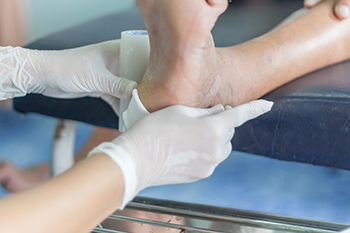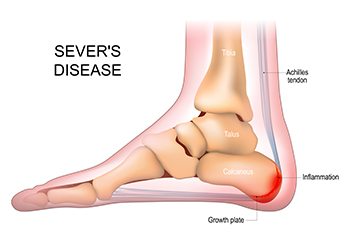
Freehold (732) 294-9393

Freehold (732) 294-9393

Foot ulcers are open wounds that develop on the feet, often affecting individuals with diabetes or impaired circulation. They typically occur due to a combination of factors, including neuropathy, which is nerve damage, poor blood flow, and pressure from footwear. Foot ulcers can vary in severity, from shallow sores to deep craters, and if left untreated, they can lead to serious complications such as infection and possibly amputation. The primary cause of foot ulcers is prolonged pressure or friction on the skin, which can result from wearing ill-fitting shoes, walking barefoot, or excessive rubbing. In diabetic individuals, high blood sugar levels can further exacerbate the risk by damaging nerves and blood vessels, impairing the body's ability to heal. Other contributing factors may include poor hygiene, smoking, obesity, and a history of foot problems. Recognizing the signs of a foot ulcer, such as redness, swelling, or drainage, is vital for prompt treatment and prevention of complications. If you have a foot wound, it is strongly suggested that you consult a podiatrist who can diagnose its severity, and offer treatment options that are right for you.
Wound care is an important part in dealing with diabetes. If you have diabetes and a foot wound or would like more information about wound care for diabetics, consult with Dr. Henry Miller from New Jersey. Our doctor will assess your condition and provide you with quality foot and ankle treatment.
What Is Wound Care?
Wound care is the practice of taking proper care of a wound. This can range from the smallest to the largest of wounds. While everyone can benefit from proper wound care, it is much more important for diabetics. Diabetics often suffer from poor blood circulation which causes wounds to heal much slower than they would in a non-diabetic.
What Is the Importance of Wound Care?
While it may not seem apparent with small ulcers on the foot, for diabetics, any size ulcer can become infected. Diabetics often also suffer from neuropathy, or nerve loss. This means they might not even feel when they have an ulcer on their foot. If the wound becomes severely infected, amputation may be necessary. Therefore, it is of the upmost importance to properly care for any and all foot wounds.
How to Care for Wounds
The best way to care for foot wounds is to prevent them. For diabetics, this means daily inspections of the feet for any signs of abnormalities or ulcers. It is also recommended to see a podiatrist several times a year for a foot inspection. If you do have an ulcer, run the wound under water to clear dirt from the wound; then apply antibiotic ointment to the wound and cover with a bandage. Bandages should be changed daily and keeping pressure off the wound is smart. It is advised to see a podiatrist, who can keep an eye on it.
If you have any questions, please feel free to contact our office located in Freehold, NJ . We offer the newest diagnostic and treatment technologies for all your foot care needs.
 Sever's disease, also known as calcaneal apophysitis, is a common cause of heel pain in growing children and adolescents, especially in those who play sports. This condition occurs when the growth plate in the heel becomes inflamed, often due to repetitive stress from activities like running and jumping. This, combined with the pressure of rapid bone growth during puberty, can create painful heels. The pain may worsen during or after physical activity and include tenderness to the touch. It may also lead to limping, especially after waking up or more intense physical activities. Treatment typically involves rest and various exercises that stretch and strengthen the leg muscles and tendons. Footwear with proper cushioning and support is also suggested to help alleviate symptoms. With appropriate management, symptoms usually resolve with the completion of the growth spurt, as the heel bone matures. If your child has painful heels and you suspect Sever’s disease, it is suggested that you make an appointment with a podiatrist for a diagnosis and management techniques.
Sever's disease, also known as calcaneal apophysitis, is a common cause of heel pain in growing children and adolescents, especially in those who play sports. This condition occurs when the growth plate in the heel becomes inflamed, often due to repetitive stress from activities like running and jumping. This, combined with the pressure of rapid bone growth during puberty, can create painful heels. The pain may worsen during or after physical activity and include tenderness to the touch. It may also lead to limping, especially after waking up or more intense physical activities. Treatment typically involves rest and various exercises that stretch and strengthen the leg muscles and tendons. Footwear with proper cushioning and support is also suggested to help alleviate symptoms. With appropriate management, symptoms usually resolve with the completion of the growth spurt, as the heel bone matures. If your child has painful heels and you suspect Sever’s disease, it is suggested that you make an appointment with a podiatrist for a diagnosis and management techniques.
Sever's disease often occurs in children and teens. If your child is experiencing foot or ankle pain, see Dr. Henry Miller from New Jersey. Our doctor can treat your child’s foot and ankle needs.
Sever’s Disease
Sever’s disease is also known as calcaneal apophysitis, which is a medical condition that causes heel pain I none or both feet. The disease is known to affect children between the ages of 8 and 14.
Sever’s disease occurs when part of the child’s heel known as the growth plate (calcaneal epiphysis) is attached to the Achilles tendon. This area can suffer injury when the muscles and tendons of the growing foot do not keep pace with bone growth. Therefore, the constant pain which one experiences at the back of the heel will make the child unable to put any weight on the heel. The child is then forced to walk on their toes.
Symptoms
Acute pain – Pain associated with Sever’s disease is usually felt in the heel when the child engages in physical activity such as walking, jumping and or running.
Highly active – Children who are very active are among the most susceptible in experiencing Sever’s disease, because of the stress and tension placed on their feet.
If you have any questions, please feel free to contact our office located in Freehold, NJ . We offer the newest diagnostic and treatment technologies for all your foot and ankle injuries.